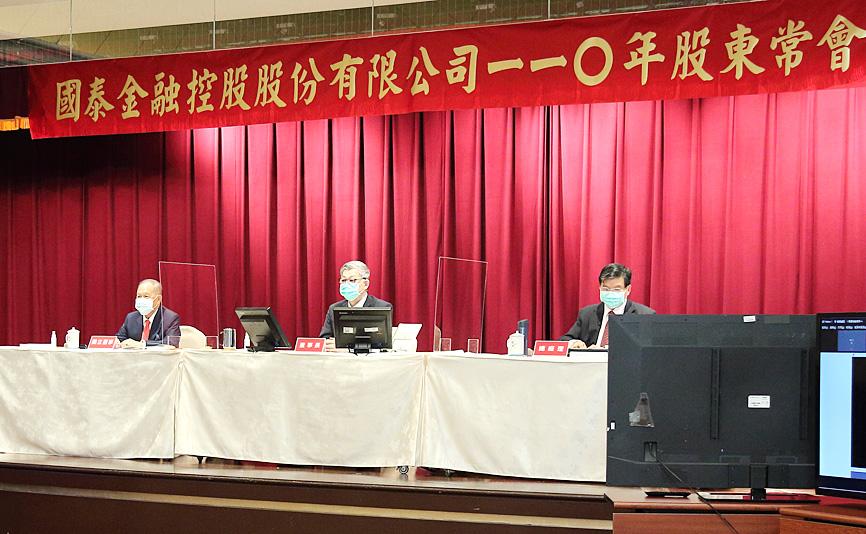Cathay Financial Holding Co’s (國泰金控) shareholders on Friday approved the company’s proposal to raise up to NT$50 billion (US$1.78 billion) in new capital to fund future mergers and acquisitions (M&As).
The financial conglomerate plans to issue fewer than 1 billion new shares to raise funds at an appropriate time, it told shareholders at an annual general meeting in Taipei.
Cathay Financial aims to build a comprehensive financial platform in the Greater China and Southeast Asia markets, president Lee Chang-ken (李長庚) told the meeting.

Photo courtesy of Cathay Financial Holding Co
The company’s banking arm, Cathay United Bank (國泰世華銀行), has opened units in nine countries in Southeast Asia, while its insurance subsidiaries have branches in Vietnam, Lee said.
“There is still tremendous room for expansion,” he said.
Cathay Life Insurance Co (國泰人壽) last year posted a loss of NT$8.8 billion from an investment in Indonesia’s PT Bank Mayapada Internasional Tbk, but Lee said that it “was only an isolated case” and would not restrict the company’s investment in Southeast Asia.
However, the spread of COVID-19 infections has limited cross-border movement, as well as slowed the company’s onsite review and due diligence regarding target companies, Lee said.
The pandemic has had different repercussions on various industries and countries, but it has also revealed some favorable M&A opportunities for the firm, he added.
Cathay United Bank has had a decline in lending and wealth management demand due to COVID-19, but the pandemic’s impact on the Taiwanese economy is likely to diminish as the vaccination rate rises and stricter anti-virus measures are lifted, Lee said.
Sales in Cathay Life Insurance are expected to improve in the second half of the year as the government plans to lower a level 3 COVID-19 alert to level 2, which would allow the company’s sales agents to visit clients in person, he added.
“As the COVID-19 pandemic has been predicted to become a seasonal illness like the flu, we expect the virus’ impact on the global economy to decrease,” Lee said.
Nonetheless, CTBC Financial Holding Co (中信金控) chairman Yen Wen-long (顏文隆) told the company’s shareholders on Friday that the global economy is yet to face challenges this year, as the difficulty of forecasting the pandemic’s development is likely to mean high volatility in financial markets.

Taiwan Semiconductor Manufacturing Co (TSMC, 台積電) yesterday said that its investment plan in Arizona is going according to schedule, following a local media report claiming that the company is planning to break ground on its third wafer fab in the US in June. In a statement, TSMC said it does not comment on market speculation, but that its investments in Arizona are proceeding well. TSMC is investing more than US$65 billion in Arizona to build three advanced wafer fabs. The first one has started production using the 4-nanometer (nm) process, while the second one would start mass production using the

‘SILVER LINING’: Although the news caused TSMC to fall on the local market, an analyst said that as tariffs are not set to go into effect until April, there is still time for negotiations US President Donald Trump on Tuesday said that he would likely impose tariffs on semiconductor, automobile and pharmaceutical imports of about 25 percent, with an announcement coming as soon as April 2 in a move that would represent a dramatic widening of the US leader’s trade war. “I probably will tell you that on April 2, but it’ll be in the neighborhood of 25 percent,” Trump told reporters at his Mar-a-Lago club when asked about his plan for auto tariffs. Asked about similar levies on pharmaceutical drugs and semiconductors, the president said that “it’ll be 25 percent and higher, and it’ll

When an apartment comes up for rent in Germany’s big cities, hundreds of prospective tenants often queue down the street to view it, but the acute shortage of affordable housing is getting scant attention ahead of today’s snap general election. “Housing is one of the main problems for people, but nobody talks about it, nobody takes it seriously,” said Andreas Ibel, president of Build Europe, an association representing housing developers. Migration and the sluggish economy top the list of voters’ concerns, but analysts say housing policy fails to break through as returns on investment take time to register, making the

CHIP BOOM: Revenue for the semiconductor industry is set to reach US$1 trillion by 2032, opening up opportunities for the chip pacakging and testing company, it said ASE Technology Holding Co (日月光投控), the world’s largest provider of outsourced semiconductor assembly and test (OSAT) services, yesterday launched a new advanced manufacturing facility in Penang, Malaysia, aiming to meet growing demand for emerging technologies such as generative artificial intelligence (AI) applications. The US$300 million facility is a critical step in expanding ASE’s global footprint, offering an alternative for customers from the US, Europe, Japan, South Korea and China to assemble and test chips outside of Taiwan amid efforts to diversify supply chains. The plant, the company’s fifth in Malaysia, is part of a strategic expansion plan that would more than triple